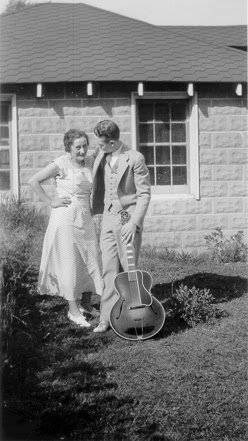By Sue Baker
Les Paul with his mother Evelyn Polsfuss.
Lester Polsfuss—later known as Les Paul—was the second child of George and Evelyn Polsfuss. Les described his older brother Ralph as handsome and outgoing, and they were fond of each other, despite the seven-year age difference and their very different personalities.
Evelyn Stutz Polsfuss loved both of her sons. Even when Les was a preschooler, she recognized his talent. She would arrange for her young son to perform for local fraternal organizations. Les was so tiny that they placed him on top of a table where he would sing, dance, and tell funny stories.
Writing about his mother in his memoir “Les Paul in His Own Words,” Les shared, “I did a lot of crazy, stupid things when I was a kid, but rather than scold me, she always took pride in the fact that I was thinking creatively and had the initiative to do something.”
Les Paul (right) with his brother Ralph.
While Les was still young, Evelyn gave him his first stage name, Red Hot Red. Les shared, “She always said, don’t look at the negative, look at the positive, and you can do it. And she shoved me out on stage the same way. ‘Go out and get ’em, Lester. Go out and get ’em.’”
Les’s ferocious curiosity meant Evelyn had to keep answering his questions. When she did not know an answer, she would take Les to the library or to a local teacher. She was determined to help her son be his best. When Les’s favorite musicians came to town, Evelyn found ways to get her son to see the performances. She even took Les to Nashville to see country and blues star DeFord Bailey.
When 13-year-old Les wanted to amplify his voice while performing, Evelyn allowed him to use her telephone and radio. Around the same time, Evelyn arranged for Les to perform on a Milwaukee radio station—and from there he never stopped.
Les Paul with his mother at her 100th birthday party.
Even when Les was an adult, Evelyn continually encouraged him to stretch to his full potential. When he was playing his electric guitar professionally, she urged him to sound different from other guitar players. That impetus drove Les to spend two years building his multifaceted sound and his invention of a new, solid-body electric guitar that turned the music world upside down.
“She was the biggest single influence of my life,” Les said about his mom, “and we were close in a way that never diminished till the day she died at the age of 101 and a half.”
Sue Baker is the program director at the Les Paul Foundation. We are grateful to the Les Paul Foundation for their ongoing support of tinnitus research through HHF’s Emerging Research Grants program. She wrote about her friendship with Les Paul, his drive to invent hearing devices, and his childhood in Waukesha, Wisconsin.










I’d read about how challenging the Social Security Disability Insurance process can be. There are so many variables: your work history, income, disability type, age, and more.